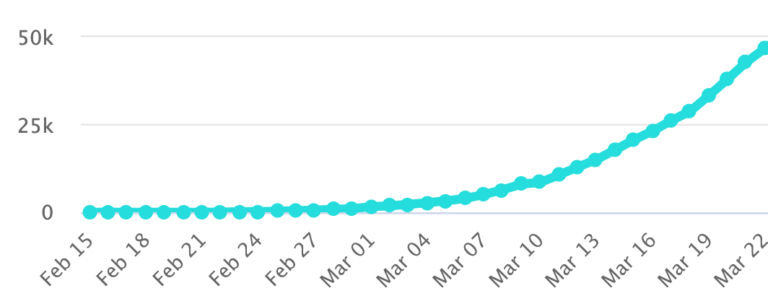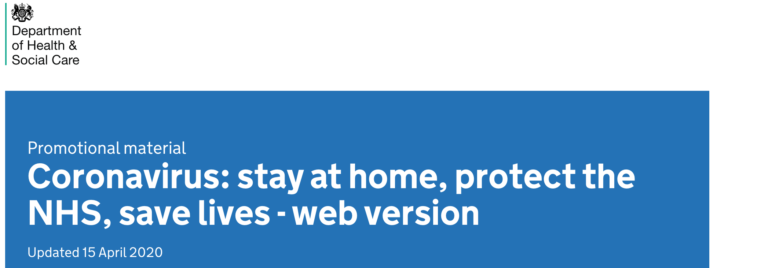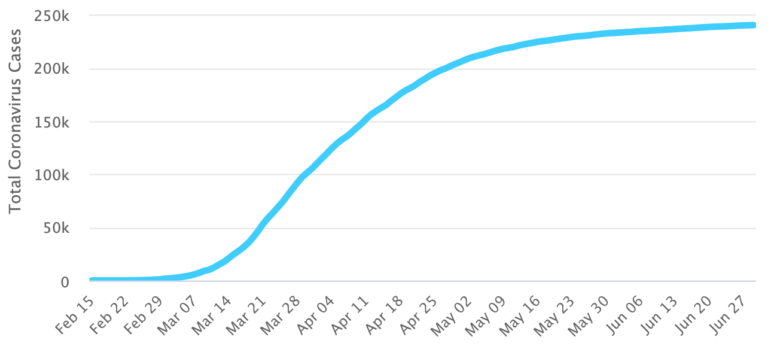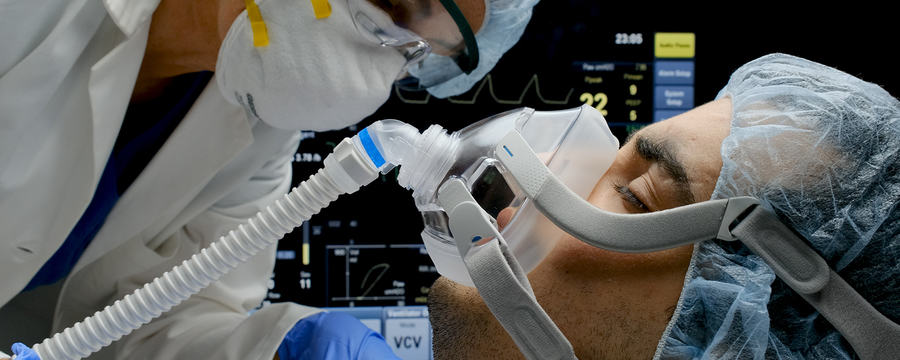Healthcare Systems in Crisis: The Effect of COVID-19
Pandemics are large-scale widespread cascades of infectious diseases that can cause severe illness and death and require much higher level of healthcare provision than normal.
A challenge for governments worldwide is to recognise the signs of an impending pandemic and put in place the necessary levels of equipment and healthcare provision before their health systems become overwhelmed.
Figure 1. Active cases in Italy 15th Feb to 21th March 2020 
The governments of many countries were slow to recognise COVID-19 as an imminent threat and in some the health services were not ready to cope with it. Italy was the first European country to have significant clusters of infections appearing in March 2020 as shown in Figure 1. By this time its health system was coming under great pressure as reported by the BBC in the following video.
This is an additional video, hosted on YouTube.
This shows the Brescia Hospital Poliambulanza in the northern Italian region of Lombardy. A doctor says it is a real calamity. A lot of people are becoming gravely ill, with breathing difficulties that put lives at risk. For the patients in the intensive care unit a mortality rate of 50% is expected. The number of patients coming in is staggering. In response there’s been such a moving commitment from the doctors and nurses – sometimes they come in even when they’re not on shift, or they’re on nights but still come in to help in the morning. Some of them have cried, but he’s never seen anyone complain. Is he worried about himself? Yes A bit. During the health crisis in China many health workers died, and he’s in the risk age group. Alessandro Triboldi, the hospital director says that it is reaching saturation point. They don’t just need more beds – they also need workers, equipment to protect staff, and ventilators.
An article in the New York Times with the headline Italy’s Health Care System Groans Under Coronavirus — a Warning to the World reports that “in less than three weeks, the virus has overloaded hospitals in northern Italy, offering a glimpse of what countries face if they cannot slow the contagion.” [1]
The pandemic has cause a worldwide shortage of equipment, especially PPE (Personal Protection Equipment) and ventilators. For example, an article in the New England Journal of Medicine [2] warns of critical Supply Shortages and the Need for Ventilators and Personal Protective Equipment:
U.S. hospitals are already reporting shortages of key equipment needed to care for critically ill patients, including ventilators and personal protective equipment (PPE) for medical staff. Adequate production and distribution of both types of equipment are crucial to caring for patients during the pandemic.
No matter which estimate we use, there are not enough ventilators for patients with Covid-19 in the upcoming months.
Equally worrisome is the lack of adequate PPE for frontline health care workers, including respirators, gloves, face shields, gowns, and hand sanitizer. In Italy, health care workers experienced high rates of infection and death partly because of inadequate access to PPE. And recent estimates here in the United States suggest that we will need far more respirators and surgical masks than are currently available.
The U.S. shortage has multiple causes, including problems with the global supply chain. Before this pandemic, for instance, China produced approximately half the world’s face masks. As the infection spread across China, their exports came to a halt. Now, as the infection spreads globally and transmission in China slows, China is shipping masks to other countries as part of goodwill packages. The United States has not been a major recipient.

Stay at home
The single most important action you can take is to stay at home in order to protect the NHS and save lives. You should only leave the house for very limited reasons:
- shopping for basic necessities, for example food and medicine, as infrequently as possible
- one form of exercise a day, for example a run, walk, or cycle – alone or with members of your household
- any medical need, including to donate blood, avoid risk of harm, provide care or help a vulnerable person
- travelling for work purposes, but only where you cannot work from home
- These are exceptions – and when doing these activities, you should minimise time spent outside of the home and ensure you are 2 metres apart from anyone outside of your household.
- Critical workers, and parents of vulnerable children, may leave the house to take their children to and from school or their childcare provider. More detail is available online. Children can be moved between homes if their parents live separately. [4]
Italy recovers
Italy was the first European country to become overwhelmed by the epidemic. By the efforts of its politicians and people the curve has been flattened and the number of new cases has begun to stabilise by June 2020.
Figure 3. By June Italy recovers and stabilises the number of cases 
Summary
In Europe COVID-19 overwhelmed the health service of Italy, the country first affected by the pandemic. Other countries were equally unprepared but because they lagged behind Italy had time to put in place measures to protect their health systems. However these measures have been frustrated by the global lack of equipment, especially ventilators and Personal Protection Equipment. This shortage is partly due to China being the world’s major supplier. Despite the huge social and economic cost, the ‘lockdown’ imposed by the British Government on its citizens is a direct attempt to flatten the curve and save the NHS. Many other countries have similar policies and similar objectives.
References
[1] Jason Horowitz, ‘Italy’s Health Care System Groans Under Coronavirus — a Warning to the World’, New York Times, March 12, 2020 updated March 17, 2020, https://www.nytimes.com/2020/03/12/world/europe/12italy-coronavirus-health-care.html?action=click&module=RelatedLinks&pgtype=Article
[2] Megan L. Ranney, Valerie Griffeth, Ashish K. Jha, ‘Critical Supply Shortages — The Need for Ventilators and Personal Protective Equipment during the Covid-19 Pandemic’, The New England Journal of Medicine, March 25, 2020, DOI: 10.1056/NEJMp2006141 https://www.nejm.org/doi/full/10.1056/NEJMp2006141
[3] Wikipedia, ‘Shortages related to the 2019–20 coronavirus pandemic’, https://en.wikipedia.org/wiki/Shortages_related_to_the_2019%E2%80%9320_coronavirus_pandemic
[4] Gov.uk. Coronavirus: stay at home, protect the NHS, save lives – web version Updated 15 April 2020 https://www.gov.uk/government/publications/coronavirus-covid-19-information-leaflet/coronavirus-stay-at-home-protect-the-nhs-save-lives-web-version
Share this
COVID-19: Pandemics, Modelling, and Policy


Reach your personal and professional goals
Unlock access to hundreds of expert online courses and degrees from top universities and educators to gain accredited qualifications and professional CV-building certificates.
Join over 18 million learners to launch, switch or build upon your career, all at your own pace, across a wide range of topic areas.
Register to receive updates
-
Create an account to receive our newsletter, course recommendations and promotions.
Register for free







